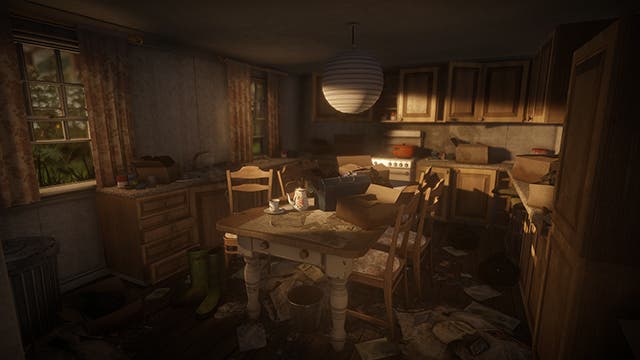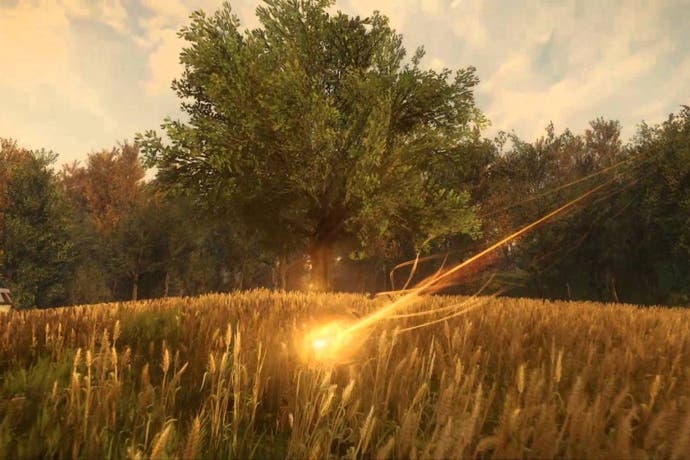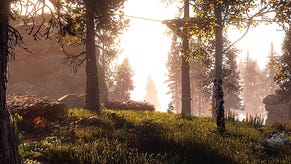Everybody's Gone to the Rapture is Dear Esther meets The Prisoner
The Chinese Room elegantly embraces 60s British sci-fi.
Everybody's Gone to the Rapture might not make a lot of sense, at least at first. Its small cast of five characters are relegated to bobbing orbs of ectoplasm that occasionally manifest themselves as ghostly apparitions of things past. Pay phones ring, only to shout cryptic messages to you, and nothing stays the same for very long. Unraveling Rapture's core mystery, however, is only one diversion. The real reason for existing within Rapture is simply to experience this beautifully melancholy piece of surreal interactive prose.
On the surface, Rapture resembles The Chinese Room's debut effort, Dear Esther, with its serene yet quietly gloomy lush landscapes telling an enigmatic tale through clues in the environment. But in design terms, it's more reminiscent of the Punchdrunk theatre company's interactive play Sleep No More. For the uninitiated, Sleep No More asks audience members to wander around a dreamy derelict hotel (with some floors representing a graveyard, asylum, or frosty winter forest) while actors pantomime scenes from Macbeth re-imagined in a BioShock-esque early 20th century Lovecraftian nightmare. No two showings are exactly the same as how you explore - and how the actors integrate the audience on the fly - will yield different scenes played at different times. At one point I think I happened upon an orgy. Or an exorcism. I'm still not really sure.
Everybody's Gone to the Rapture doesn't have orgies or exorcisms (that I know of), but the feeling is similar. Unlike Dear Esther or even the developer's previous effort, Amnesia: A Machine For Pigs, you don't merely walk through a linear environment while a story is told to you. Instead, you can explore the rural Shropshire landscape in any order and interact with the environment, which will affect the story in mysterious and unknown ways.
"We wanted to get away from that idea that you just walk around and the story unfolds. We wanted to give the player a more active role in creating a story," says creative director Dan Pinchbeck. "We want to make sure that there's always discovery to be had when a story fires off."
While Rapture is mechanically limited to walking around and looking at stuff, you'll interact with the world by occasionally happening upon these strange phenomena represented by swirling lights. Tilt the DualShock 4 the right way and you can tune into a frequency, and everything changes. An empty house with a subtle, static-filled visual distortion overlayed holds one of these peculiar passages, and activating it makes the interior suddenly look vastly different. The kitchen is now in disarray and TVs display different broadcasts. When I ask if activating these phenomena would influence things in other parts of the world Pinchbeck grows cagey.
"The world evolves," he coyly suggests. "And for me, what's important is the player feels the world evolving. I'm less interested in them going 'because I did A, then B happens.' It's more the sense of 'something's happened!' But you might not understand it. It might not be immediately obvious."
So you're constantly shaping this world, but it's not always clear how, since by design the triggers are ambiguous. Pinchbeck and company don't want the narrative to be boiled down to a binary series of branches, because at that point it just feels like busywork flipping through all the possible outcomes. Instead, it's very important to the developer that the world is constantly changing.
On this note, Pinchbeck explains that the environments and audio are completely ambient. Stand in the same place for a while and you won't hear the same crickets chirping in an audio loop. Time of day, weather, and details in the environment will change dynamically over the course of the game, so backtracking to re-explore an earlier area will never be a banal trudge as you'll find different things and have a different experience. Furthermore, Pinchbeck suggests that sometimes these "strange phenomena" will yield different voice tracks depending on which signal you tune into. The overall story will remain the same, but you might hear it from another character's perspective.

"There's something so fundamental in games about just being in the world. You don't have to understand everything. But if you feel the connection, if you feel the immersion, the sense of place, the wanting to be there, that's enough," Pinchbeck joyfully rants. "And it's alright if not everything is explained to the player at the time they see it. Understand that sometimes it's about the sense of feel in a place that's really, really important."
While the setting and scenery are paramount to Rapture's overall experience, Pinchbeck reiterates that this is really a character-driven drama, even if that's not entirely obvious from the get go. "Rapture is a game about the end of the world, but it's really a game about people," he states. "Fundamentally, the game stands or falls based on whether the player cares and that's our central challenge with it. And that's our central belief as game developers as well. Games are all about the emotional link between you and the system. If you don't care, the game fails."
One concern I voice to Pinchbeck is that the narrative's puzzling plot could potentially be too intellectually distracting or lack the appropriate context to deliver the emotional payoff he's going for. "I think it's a central balancing act," he replies before offering the following metaphor that he jokes is kind of terrible: "It's like a Jackson Pollock painting. You don't worry about the order of the paint that you're canvassing. You take it in totality."
"It's more important to feel than to know," he adds more confidently. "It's not a game where I want players to be going into it thinking 'I must solve this.' You might not be able to, just as you may not know the answers in life. It's okay to not know everything."
"I'm not worried if the player gets to the end of the game and says 'I still don't know what was going on fully, but had a great time.' That they had the great time, that they had a good experience, that's fundamental," says Pinchbeck.
Ultimately, Everybody's Gone to the Rapture resembles a more dynamic, surreal, sci-fi variation on Gone Home. Like Fullbright's debut, this is non-linear exploration-based storytelling, but you're affecting that story and how it's presented to you - even if you're not sure how. As such, Rapture is sure to be divisive with its stubborn refusal to hold your hand or clarify its opaque systems. Like The Chinese Room's previous efforts, not everyone will get it, but a certain type of player will find its quaint end-of-the-world drama rich in emotional nourishment whether they understand the intricacies of its plot or not.










